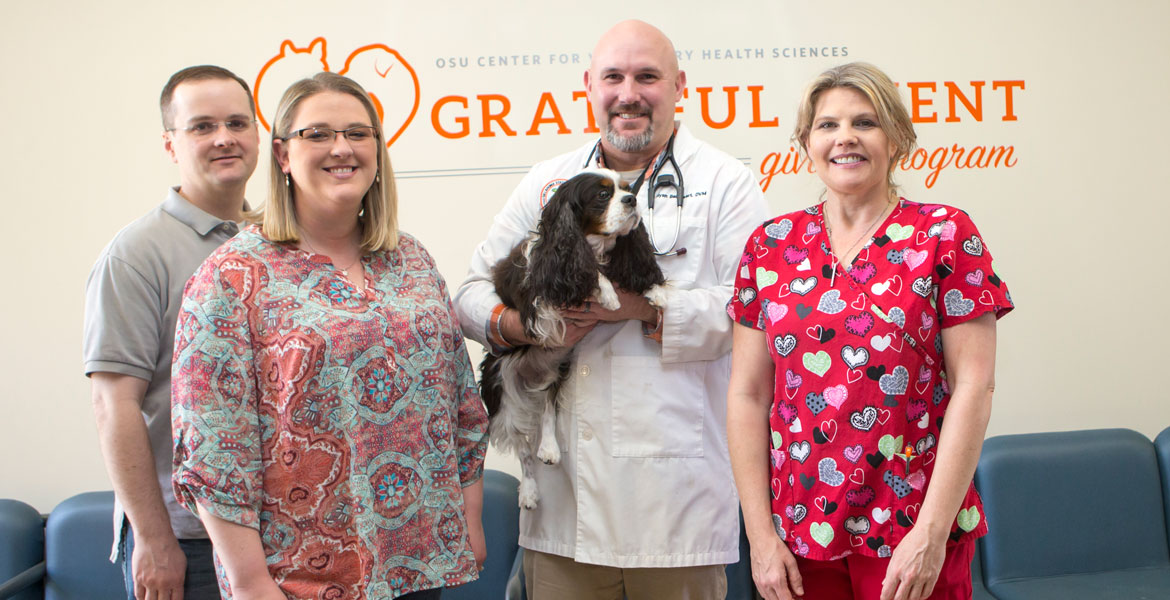
Going the Extra Mile to Save a Dog
Thursday, August 30, 2018
Some owners will do anything for their beloved dog. Some will go the ‘extra mile’ or 6,400 miles to be exact, to make sure their pet is happy and healthy. In Riggs’ case, his owners went halfway around the world to Japan just for him.
Riggs is a 9-year-old Cavalier King Charles Spaniel owned by Cory and Ashley Brown of Rogers, Ark. Dr. Steven Hodges (OSU DVM ’02) of Oklahoma Veterinary Specialists of Tulsa, Okla., initially treated Riggs for his heart disease until Hodges reached out to Dr. Baumwart for assistance.
“When it got beyond what he felt comfortable doing, he reached out to Dr. Baumwart,” explained Brown, who has been a veterinary assistant for more than 20 years. “They consulted for a little bit and when they saw I wasn’t stopping in my effort to keep Riggs healthy until surgery, we booked it to OSU for further assistance. I do believe Riggs gave us all quite a challenge in his months before surgery!”
It was the first time Brown had used OSU’s Veterinary Medical Hospital. Dr. Ryan Baumwart (OSU DVM ’02) is the board certified veterinary cardiologist on staff.
“Riggs had a heart murmur caused by a leaky mitral valve. It was treated with medication, however, as time passed and his condition worsened, the medication was no longer helping,” said Baumwart. “He was on multiple medications and Dr. Hodges called and asked if we could see him (Riggs) to help manage him because his owner was interested in pursuing surgery in Japan. We saw Riggs in December (2017) right before Christmas. When Riggs’ heart would beat, a large amount of his blood flow would leak across the mitral valve causing his heart to work much harder than normal and had begun to fail.”
Over the three years since Riggs was diagnosed with a heart murmur, his strength, stamina and energy were diminished by the mitral valve insufficiency causing him to go into congestive heart failure in July 2017.
The Browns did their research and found Dr. Masami Uechi at the Jasmine Veterinary Cardiovascular Medical Center in Yokohama, Japan. Yokohama is just south of Tokyo. Uechi performs approximately seven to ten mitral valve repairs a week. He is the only doctor in the entire world who has been able to successfully come up with a surgical technique that works to repair the mitral valve in dogs. He has performed more than 900 repairs with a success rate of 92 percent.
In March 2018, Riggs, Cory and Ashley flew to Japan after a long 6-month wait due to Japan’s required 180 day rabies quarantine requirement to come into the country with a pet.
“It’s not what you would think of an actual quarantine being,” states Ashley. “It’s just a waiting period they require because Japan is a rabies-free county and America isn’t. They obviously have to have strict regulations to keep their country free of rabies, but it sure was an excruciating long wait with a sick dog. There were many days I didn’t think we were going to make it to surgery because of the wait time.”
Riggs was considered in stage D heart disease, which is the most advanced and decreased his likelihood of success with surgery to 80 percent. The Browns felt this was still a very high success rate knowing that Riggs never would have an 80 percent chance to live and be saved with conventional treatments of oral medications.
Riggs’ heart surgery was performed on March 12, 2018, with a team of ten surgeons led by Dr. Uechi. His surgery was a success and he had no complications. Riggs was discharged from the clinic six days post-surgery. He and his family remained in Japan for another ten days for rechecks at the Jasmine clinic.
On April 16, 2018, Dr. Baumwart saw Riggs for his first of four follow-up visits and echocardiograms required after returning home to the United States. With Riggs being known as only the sixth dog from America to have had this surgery at the Jasmine Veterinary Cardiovascular Medical Center in Japan, it’s definitely a first for OSU to have a mitral valve repair patient.
“We’re here today to have his one month, post-op recheck after surgery and to get current measurements on his heart,” confirmed Brown. “Dr. Uechi wants to make sure Riggs’ heart is continuing to decrease in size post op as it should. It is important for an experienced cardiologist to take his measurements so they’re done correctly.”
“Riggs’ condition has changed dramatically,” explained Baumwart. “He’s come off a large amount of medication. He looks like a different dog. His heart size has shrunk very dramatically at one month.”
“Riggs prognosis is wonderful,” beamed Brown. “For three months he’s at a higher risk of having a blood clot so he’s on anti-clotting drugs right now. He was really sick before surgery and his multitude of medications were not working for him. After Japan, his prognosis is that he probably won’t die from his heart disease. He’ll get to live a normal, long life as much as he can.”
Riggs will return to OSU’s Boren Veterinary Medical Hospital to see Dr. Baumwart at three, six and 12 months post-surgery for rechecks with an ultrasound.
“I would not have guessed that somebody would be willing to take their dog to Japan, spend the amount of money they did, do open heart surgery and go to the measures that Ashley did,” added Baumwart. “She’s a very dedicated owner.”
If you would like more information on mitral valve repair, please visit the Mighty Hearts Project website, the JASMINE Veterinary Cardiovascular Medical Center website, or the Mighty Hearts MVD Community on Facebook and Instagram.
